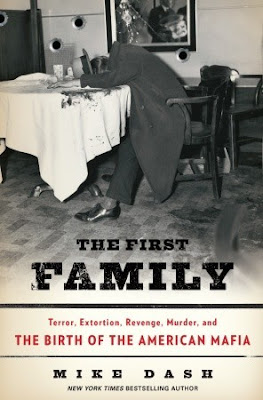 Here's an excerpt from a book I recently read, "The First Family: Terror, Extortion, Revenge, Murder, and the Birth of the American Mafia," by Mike Dash:
Here's an excerpt from a book I recently read, "The First Family: Terror, Extortion, Revenge, Murder, and the Birth of the American Mafia," by Mike Dash:Though useful, insofar as they did dirty jobs that earlier immigrants now thought of as beneath them, Italians from the southern provinces were regarded with hostility by many New Yorkers. Their dark complexions, lack of English, and devotion to an alien food were all regarded as distasteful. They were much more volatile than northern Europeans, it was commonly supposed, and prone to deadly knife fights and vendettas. Worse, only a minority embraced American institutions with the fervor expected of immigrants. Few Italians mixed with men of other nationalities, and well under half actually applied for U.S. citizenship. For many Sicilians and Neapolitans, the United States was a place to work hard, spend little, and save ferociously; many planned to return home with their savings. These were habits many Americans regarded as ungrateful and insulting.
Opinion
hardened further at about the time the Terranova family first came to
Manhattan. There was concern at the number of anarchists and socialists
pouring into the country to preach revolution. There was concern at the
number of criminals. Nineteen Italians in every twenty of those passing
through Ellis Island were found to be carrying weapons, either knives or
revolvers, and there was nothing in American law to stop them from
taking this arsenal into the city. The Sicilian police were said to be
issuing passports to known murderers in order to get them out of the
country—a calumny, it transpired, but there were still real reasons to
take such problems seriously. So many Italians were passing through
Ellis Island every day that it was not possible to check their
statements properly. But when the 1,400 passengers on board the SS
Belgravia were subjected to a spot investigation, one in six was found
to have given false information. “Statistics prove,” the Herald
trumpeted in one alarmist feature article, “that the scum of Southern
Europe is dumped on the nation’s door in rapacious, conscienceless,
lawbreaking hordes.”


No comments:
Post a Comment